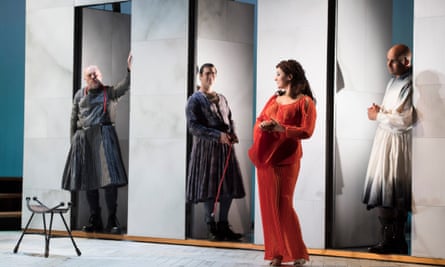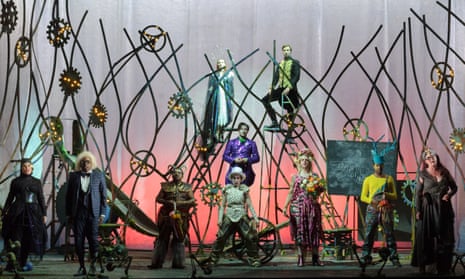English Touring Opera’s autumn season focuses on Venetian opera with new productions of two 17th-century masterpieces, Cavalli’s La Calisto and Monteverdi’s Il Ritorno d’Ulisse in Patria, the latter performed under the title Ulysses’ Homecoming.
Cavalli’s bittersweet tragicomedy, at once a study of the vagaries of desire and a Platonic disquisition on the nature of spiritual love, is conducted and directed by Timothy Nelson, whose staging is an attractive if occasionally unwieldy affair. Takis’s design for the forest, where George Humphreys’ philandering Giove dons drag to pursue Paula Sides’ virginal Calisto, is vaguely post-apocalyptic, with its twisted bits of metal, cogwheels and Anglepoise lamps a reminder that the opera takes place during Giove’s re-creation of the world after its destruction by fire. The costumes, all velvet, silk and brocade, are 80s new romantic. Endimione (Tai Oney), whom Cavalli, thinking of Galileo, transformed from a shepherd into an astronomer, has become Einstein, gazing soulfully through his telescope at Catherine Carby’s distant Diana. Susanna Fairbairn’s Juno is a dominatrix wielding a riding crop.
It’s finely sung. Carby and Oney sound ravishing together in their scenes, which form both the opera’s emotional centre and the focus of its ideological concerns. Humphreys impeccably judges Giove’s mix of raffishness and authority, while Sides displays an appealingly sensual, smoky tone throughout. As a conductor, Nelson can be spacious, which means the evening takes a while to gather momentum, though the final scenes are unquestionably moving. Diction could be better, and it was perhaps a mistake to replace surtitles with a synopsis of the narrative.

Ulysses’ Homecoming, meanwhile, is given a staging of extraordinary beauty and simplicity by James Conway, in which little is allowed to detract from the narrative and characters or the emotional immediacy of the score. Takis is again the designer. A panelled wall opens to reveal the gods above and the humans below. Destiny works unobtrusively here, though we see it in recurrent images of red threads linking the characters, and in semi-abstract shapes that eventually outline the bow that Benedict Nelson’s Ulysses must wield to dispatch Penelope’s unwanted suitors. It’s a production in which less means infinitely more: a scene in which Carolyn Dobbin’s Penelope is proprietorially pawed by the suitors is deeply unsettling without being remotely explicit.
Conducted with great love and care by Jonathan Peter Kenny, it’s exquisitely sung by a fine ensemble cast. Nelson and Dobbin rightly dominate as the central couple, singing with intense nobility, their final scene together conveying a flood of pent-up emotion by the most restrained means. But there are also outstanding performances from Martha Jones and Robert Anthony Gardiner, beguiling together as Melanto and Eurymachus, and from Nick Pritchard’s forthright, attractive Telemachus. As in Joyce’s Ulysses, the final word is “yes” and the whole thing is a wonderfully affirmative experience, as well as being profoundly touching.

Comments (…)
Sign in or create your Guardian account to join the discussion